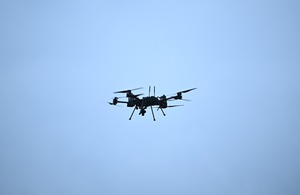Successful trial paves the way for improved reconnaissance on Army operations
Recent trial saw a single operator controlling three uncrewed vehicles, which detected and classified threats.

Uncrewed air vehicle in successful trial
- UK first comes as government doubles investment in autonomous defence technology聽committing an extra 拢2bn this parliament
- Next stage of trial will see drone swarms tested for intelligence, surveillance, and reconnaissance, delivering on recommendations set out in the Strategic Defence Review,聽and the Government Plan for Change.
Soldiers are set to be better protected, and Army surveillance operations enhanced, following a successful trial in which a single operator controlled three uncrewed air and land vehicles. 聽
The trials, conducted by the Defence Science and Technology Laboratory (Dstl), proved that robotic and autonomous systems (RAS) can be integrated into and controlled from crewed command vehicles, in a UK first.
Drawing on lessons from Ukraine鈥檚 battlefields, this innovative use of RAS will play a vital role in strengthening the Army鈥檚 reconnaissance capabilities while reducing risk to personnel, allowing them to operate further from the frontline.
The live trial took place on Salisbury Plain with a drone operated in tandem with two uncrewed ground vehicles, commanded by a single operator in a crewed vehicle. The autonomous systems were equipped with cameras and automatic target recognition software to detect and classify threats, which were relayed to the mission operator.
Following recommendations set out in the Strategic Defence Review, this government is doubling investment in autonomous technology - investing an extra 拢2 billion this Parliament, following the Prime Minister鈥檚 historic uplift in defence spending to 2.5% of GDP from 2027. This will see autonomous systems, including drones, improve accuracy and lethality for our Armed Forces, boost UK export potential and drive jobs and growth across the country.聽
Thales designed and developed the trial for Dstl, supported by a number of specialist technology suppliers. Dstl鈥檚 work supports thousands of聽highly skilled jobs across the UK supply chain, including 7,000 staff employed by Thales directly, supporting the government鈥檚 Plan for Change.
Following the success of the trial, Dstl will apply the concept to further missions, including deploying swarming drones in an intelligence, surveillance and reconnaissance role.聽
Minister for Defence Procurement and Industry, Rt Hon Maria Eagle MP said:聽
As set out in the Strategic Defence Review, we plan to use drones, data and digital warfare to ensure our Armed Forces stronger and safer, whilst boosting jobs and innovation across the UK.聽
This trial is an example of our Government鈥檚 new partnership with industry; delivering the cutting-edge technology to our front line troops and making defence an engine for growth, as part of our Plan for Change.
The trial demonstrated the extension of the UK鈥檚 Generic Vehicle Architecture standard 鈥� which has also been adopted by NATO 鈥� to autonomous systems. Through integration into an internationally recognised system, the trial could lead to enhanced interoperability between allies, with the ability to deploy autonomous systems, sensors or software between vehicles at reduced risk and cost.聽
Dr Paul Hollinshead, Dstl鈥檚 Chief Executive, said:聽 聽
Dstl identifies and harnesses the emerging technologies that will deliver mission success through science and technology advantage for UK forces.聽聽
These technologies support highly skilled jobs and create opportunities for growth throughout our specialist industry suppliers.